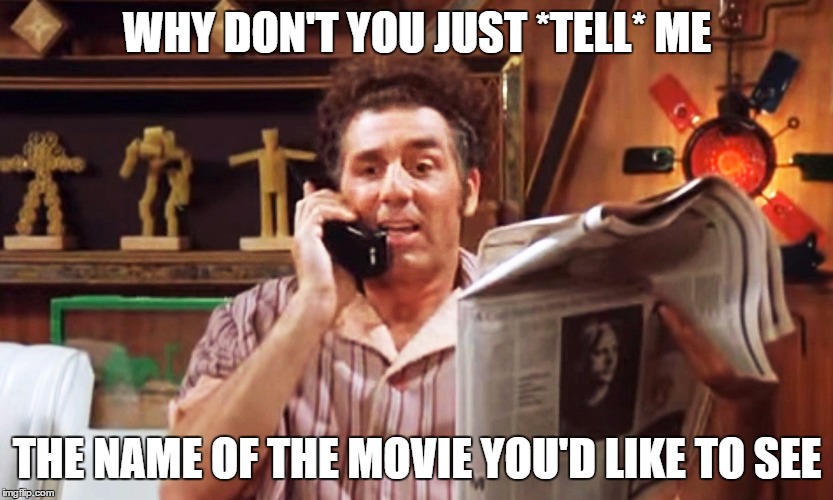Asking For Things
You know that episode of Seinfeld where Kramer takes over the Moviefone line? I've been thinking about that a lot lately, because I'm trying to be more direct with people.
When I speak, there's a lot of not-so-accurate attempts at mind reading (on both sides) going on that I can escape when I write.
I don't know why I tend to couch what I'm trying to say in caveats and preambles when I speak. It's easier to be direct when I'm writing. Perhaps it's because I know that in written form both writer and reader are freed from the physical performance of human interaction, we're both protected from all of the extra-lingual elements of conversation by the veil of the screen.
Or perhaps it's because spelling out thoughts letter by letter reveals the absurdity of wishy-washy ways of articulating thought. Thoughts in print look more valid than they sound. Or of course, there's the fact that if I were to post audio of myself speaking aloud each revision of this post as I write it, that would make for a rather horrendous listening experience, let alone much of a conversation. In person, you are only ever hearing a draft, a sketch of a thought.
But I want the way I speak to be more like the way I write, with the calm assurance of someone who knows what they have to say is of value to the conversation. When I speak I am constantly reassessing the feedback I am getting (or think I am getting) and letting it dictate revisions, trail-offs, justifications, and apologies. I know my words have value and meaning, but I want to present them in a way that demonstrates that knowledge. I want people to want to hear what I have to say, and I want them to feel rewarded when they listen to me.
One way to increase the value of your words is to decrease supply. When you're writing, you're always trying to produce more and build an audience. But face to face, the one who speaks the least draws the most attention when they break that silence.
The other way is to make sure that what you're saying is consistently valuable. Draw a clear picture for your audience, set out with an objective and get your listener there as painlessly as possible. This is my true goal because in person I need to speak up more, not less.
So I've started an experiment: I just tell people what I'm really thinking. Or ask them what I'm really wondering. The hardest part is articulating to myself what I'm thinking in a way that is most immediately relevant to that other person.
I thought I'd tried everything to get from A to B, but I never thought to simply concentrate on B, and go.

